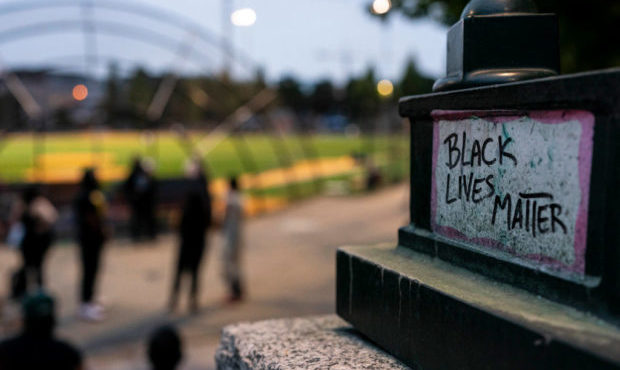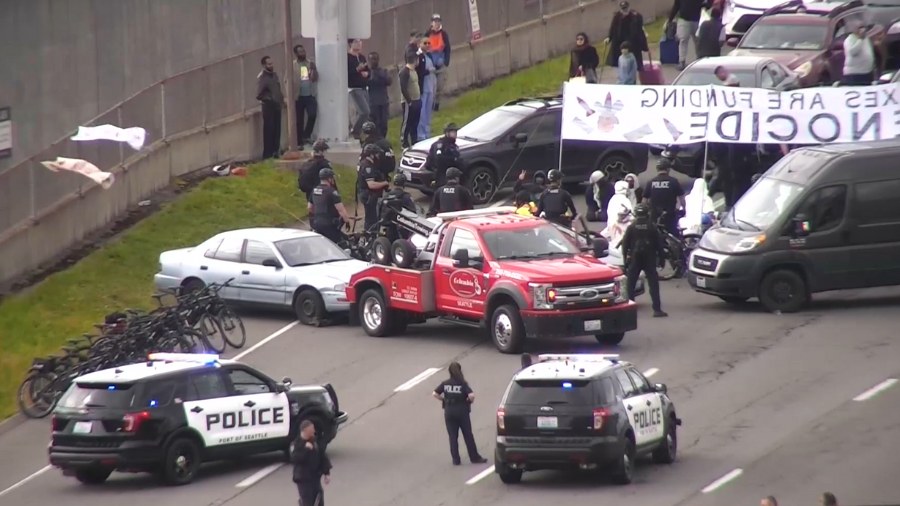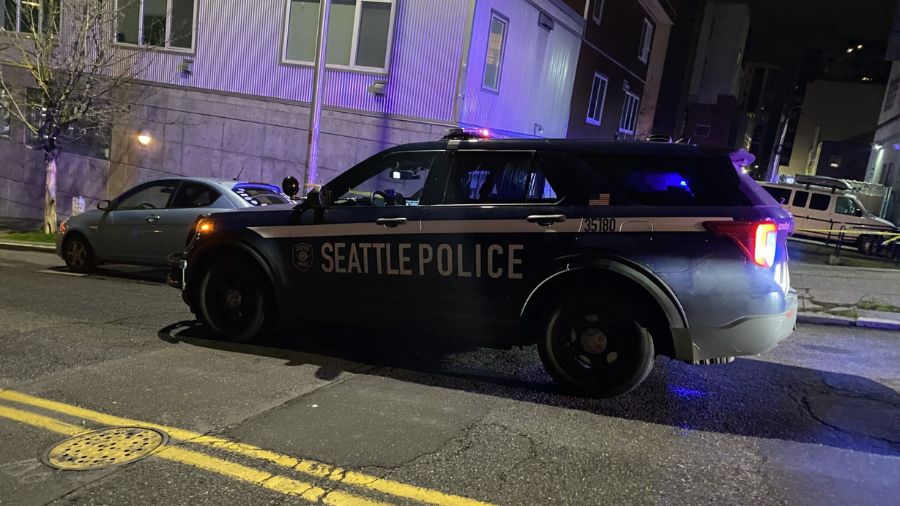Investments should be ‘determined by the community,’ not by City Hall
Sep 28, 2020, 4:28 PM | Updated: Sep 29, 2020, 7:50 am

Protesters gather to hear from Nicole Blake Chafetz, the aunt of Jacob Blake, during a Black Lives Matter rally on August 30, 2020 in Seattle, Washington. (Photo by David Ryder/Getty Images)
(Photo by David Ryder/Getty Images)
Seattle Mayor Jenny Durkan is pledging $100 million from the city’s general fund to invest in communities of color. But where is that money going to go? And who is going to advise the mayor’s office on how it should be spent?
Sean Goode, the executive director of Choose 180, a local organization that provides alternatives to incarceration for young people, was asked to be part of the task force that will look into how this money should be spent. He has since declined the invitation.
Police reform efforts at state level focus on accountability, transparency
“The mayor’s office is working on putting together a task force of four people to reflect different aspects of the Black, Indigenous, People of Color community, and the city of Seattle,” Goode explained on KIRO Radio’s Gee & Ursula Show. “And have those four people be stewards over a larger process to determine how that $100 million is likely to be spent. They reached out, they asked, and in earnest, I initially said yes. I was excited about the possibility of building a bridge between the mayor’s office and some of the folks in the community who have been in opposition to some of the ways that the office has functioned.”
“And ultimately, the community that I’m most proximate to, that I closely identify with, weren’t willing to lean in to this approach, in large part because it originates in the mayor’s office and because it starts there, it can never really be a true community-led process. Even if community members are being asked to steward it,” he added.
So he chose to decline the invitation to join this group.
“First of all, let’s begin that the $100 million was brought forth, and it was initially, in June, said to be allocated towards the Black community, and it was a response because of the protests and the people who have been out in the streets every single day,” he said. “The everyday marchers and others who have been coordinating marches asking for Black lives to be recognized, and for the inequities that have been perpetuated on Black lives, to create a pause on the Seattle process as it typically is for resources to be put into community to help offset some of the harm that’s been done historically in the city of Seattle.”
“And the challenge is, is that when you want to have a community process, a process where the community is helping to determine, then how do you define community? And if we’re not going to intentionally engage a broad population of folks to ask them their opinion on where the needs, the gaps, and the essential things that need to be present in our community are, then we’re really doing a half-baked process that’s not truly gathering a community voice,” he added. “We need more than people who are identified by the mayor’s leaders, and we need more than areas that have been identified by the mayor’s office as investment areas and a task force assembled to be able to accomplish that.”
He also noted that it’s going to take months to develop plans and for any investments to come to fruition.
“My greatest concern, as it speaks to the task force,” Goode explained, “is that if you invest $100 million in this way and you’re not actually able to take the time to capture the community’s voice at large, then will we really be investing in the things that the community desires, or will it be the opinion of a few determining where a whole lot of money is being allocated?”
Goode believes that we are at a place where if the mayor were to lean into some of the voices in the community, then Seattle could be “much more balanced and equitable.”
“I often think about the no new youth jail movement and how now here we are with Dow Constantine, sharing that in 2025, he wants to close down this incredibly expensive facility or repurpose this incredibly expensive facility that we invested hundreds of millions of dollars of our tax dollars into,” Goode said. “And if we would have listened to young people initially, maybe we could have foregone building that thing in the first place. And now we have young people and activists and PhDs and a variety of brilliant minded Black folks who were asking the mayor’s office to pause this process and engage in what would be an authentic participatory budgeting process.”
If that were to happen, Goode says time and resources could be saved to make sure the money is spent in a way that honors the community’s needs.
He says he thinks he was selected in part because he sits in a unique seat in the community.
“I imagine that if I were to be on the task force, it would lend a type of credibility to it that may have others lean in and that wouldn’t likely lean in otherwise, which is why I opted to step off,” he said. “Because when those folks that I would hope would lean in said that they wouldn’t, then I would only be there representing my own self interest. And my interest is what’s best for the Black community, the BIPOC community, or the city of Seattle, as determined by the community and not determined by folks who are in office.”
KIRO Radio’s Ursula Reutin pointed out that the mayor seems to be trying to find a middle ground, noting that we want to invest but there has to be some sort of checks and balances. Durkan doesn’t want, nor do the general public really want, to just write a blank check.
“I wouldn’t feel comfortable handing over a blank check, even from my personal budget, let alone from the taxpayer budget,” Goode agreed. “So I’m absolutely with you and we agree, and the pause is, let me be clear: The reason why I stepped off is in part because of the process. But it’s also in part because of the other outstanding questions and ways of being that don’t allow us to really get the best out of the $100 million.”
“When we talk about a participatory budgeting process, it’s a democratic process in which community members decide how to spend part of a public budget,” he said. “It gives people real power over real money.”
Goode says the determination of where the dollars are best spent should come from the people who would benefit the most from those dollars.
“Too often, there’s so many degrees of separation between the people who would benefit from the investment and the people making the determination about how the investment should be made,” he said. “And participatory budgeting shrinks that gap. So it’s actually the folks who would likely benefit the most that are saying, yes, this is how we’d like these dollars to be spent, and that takes time, and it takes more time than that’s currently allotted in what this current plan of the mayor is proposing.”
But then, KIRO Radio’s Gee Scott asked, would it not be better for you to be at the table even though you’re not liking the process? At least you’re there and trying to promote change, even if it’s incremental?
“I’m listening to a book on Audible, The Sword and the Shield. It’s about Malcolm X and Martin Luther King Jr. And in this book they highlighted a speech that John F. Kennedy gave in 1963. And the inequities and the disparities that JFK spoke about in 1963 are still present today, some 60 years later,” Goode said. “Now, if almost 60 years later, we’re having the same conversation about the same inequities in the Black community, and we’ve played the role of acquiescing to power for the sake of having a seat at the table and we’ve had the conversation about isn’t it better to have a spot where I can say that so then I could help influence? We’ve done that, and at this point, it’s exhausting to consider where we might be 60 years from now.”
“If my grandchildren and my great grandchildren are fighting the same fight that we’re engaged in today, then we have dramatically failed and only continued to delay and dilute harm and not eliminate it,” he added. “And quite frankly, I cannot, in my integrity, engage in a process that is only delaying the inevitable.”
Goode also doesn’t think we should continue to invest in the things that cause the community harm while investing in solutions to offset that harm, as we’ll end up in the same place having a conversation about how much money is needed to make things better.
“It’s in our collective voice and our collective harmony that City Council and the mayor’s office begin to pivot away from their traditional ways of being and engage in alternatives that can allow us to live into a future that we get to see,” he said.
“I cannot continue to sit at tables that only delay us from experiencing the true liberation we need as a community,” Goode added. “And candidly, I’ve served young people in this community in a variety of capacities, but well over the past decade plus, I served in the chaplain in a juvenile detention. I did gang and group intervention work in South King County. I served as a minister of a church in South King County. I’ve been involved in the lives of our community in a variety of different ways. And if given this opportunity to lead in this manner, then it behooves me to take a leadership role that is a catalyst for something different, instead of adding sustenance to what has always been.”
Restorative justice: A different path to accountability for young offenders
Goode reminded listeners that our collective voice is how change will be made.
“Just to affirm before we go, it is imperative that all of us in this community, everybody that’s listening right now, realize that we don’t have to be the same in order for us to get on the same page with each other,” he said. “And our collective voice is where the power lives, not within City Hall and not within the council. Our collective voice is how things move.”
“Invest in Black community, divest from the things that harm Black community, believe that there is a possibility of public safety that exists without overwhelmingly resourcing policing, and if public safety can exist, our resourcing work like [Choose 180’s] and the many others that are doing similar things that offset the need for criminal legal system to exist altogether,” he added. “This is not pie in the sky. This is not catch and release. This is not any of those stigmatized ways of being. This is simply an opportunity we have as a community, as a whole, to take a pause in the midst of these dueling pandemics of COVID-19 and racism in our community and ask ourselves this question: Who should determine what’s best for the people, the people or City Hall?”
Listen to the Gee and Ursula Show weekday mornings from 9 a.m. – 12 p.m. on KIRO Radio, 97.3 FM. Subscribe to the podcast here.













